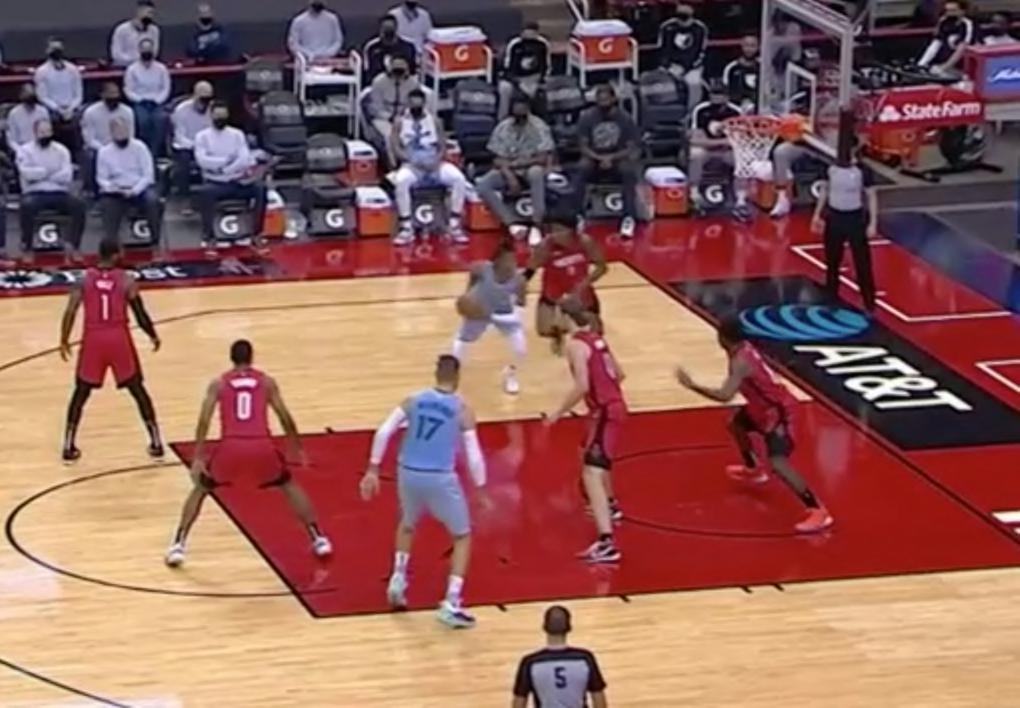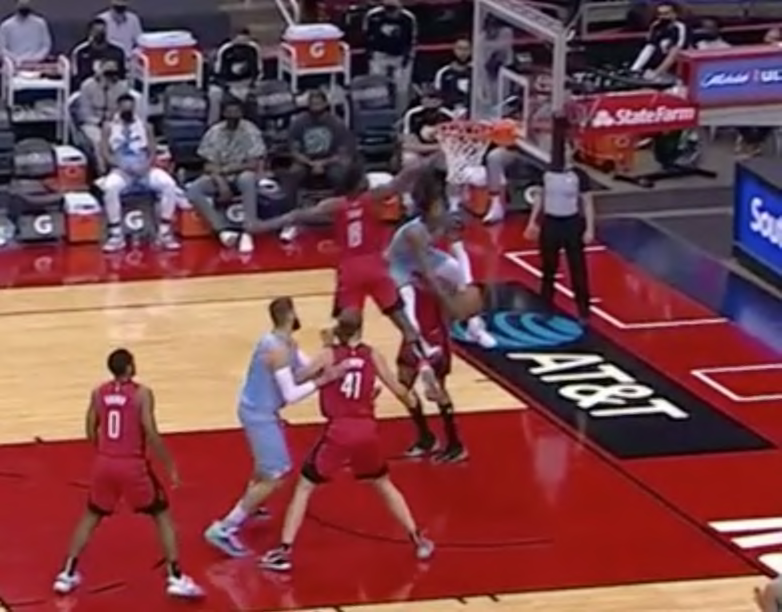Ja Morant is an incredibly rare young talent, a productive star comfortable working with every element of basketball style.
Style and aesthetics are an indelible part of basketball but the conversation around them is pure chaos. For a purely qualitative set of ideas, it’s not surprising that things are moving in every direction at once. But even with the knowledge that all see and experience the stylistic elements of basketball in different ways, formalizing the language we use can help draw meaning from the chaos.
Last week, I drew on my (admittedly rudimentary) knowledge of visual arts and it’s defining elements, to propose a similar set for basketball — The Elements of (Basketball) Art.
- Power: Physical strength, force, momentum, etc.
- Speed: Speed, quickness, acceleration, both fine and gross motor
- Distance: Length, height, vertical leap, distance traveled
- Complexity: The sequencing of connected and related actions
- Precision: Accuracy, fine motor control, error avoidance
- Creativity: Actions and ideas that are common, uncommon, rare, etc.
- Stakes: Game situation, score, time remaining, etc.
In the effort to help define and contextualize each stylistic idea, I offered a few extreme examples for each. The outliers whose games are primarily defined by their work with one specific element — like Kyrie Irving with complexity and precision, or Russell Westbrook with speed.
But most of the players I landed on were veterans, players whose personal style had been solidified by a multi-season career of experience and refinement, adapting what they do best to achieve maximum success (after all, no one except maybe Lance Stephenson played NBA basketball as a purely aesthetic endeavor). But I also found myself intrigued by the idea of young players at the other end of the spectrum. Someone like Ja Morant — whose skill and athletic abilities give him the potential to work with any stylistic element, in almost any medium, and the aggressive enthusiasm to experiment with all of them.

Ja Morant works with speed and distance
Morant’s leaping ability and long strides allow him to create enormous amplitude — rising for dunks, soaring through the air chewing up empty space in the blink of an eye. He’ll take and occasionally make a deep 3 but his work with speed and distance is more about his body than the ball. As much as any player in the NBA right now, his explosive acceleration is leveraged in three dimensions.
You can see it all on display in the clip above, the way he times his acceleration to make sure he can get to the ball without creating contact with Crowder, throttling up at the exact right moment, windmilling both his arms as he realizes in mid-air he needs to block the shot with his right instead of his left hand, and then using every inch of his wingspan to tip it off the glass.
Ja Morant works with complexity and precision
Morant can often project a certain wildness, an inherent chaos as he careens through possessions. This sense is driven by the improvisational nature of his touches, the way he strings together disparate actions as he responds to oppositional stimuli from the opponents. But the veneer of chaos, of pulling an increasingly absurd sequence of ankle-breaking rabbits out of under-screen and drop defensive hats, distracts from just how under control and precise each individual action is.
Double crossover. Patiently wait for the partial recovery. Another double crossover to completely finish the defender. Uncontested teardrop floater in the lane. In-and-out dribble straight into a fluid behind-the-back to fly through the two defenders, one of whom is utterly frozen by the mind-bending illusion. Hesitation left. Jump stop to the right, setting up a two-foot launch and a soft layup, millimeters over the outstretched hands of two defenders who are so well positioned you can’t even see Morant as he releases the ball.
Ja Morant works with creativity
Morant’s incredibly high skill level and potent athleticism are a platform from which he can regularly manifest the improbable and borderline impossible. They allow for so many possibilities and he is already adept at summoning the ones that will work and the ones that will put our jaws on the floor.
Here, he tries the baseline, spins back into traffic and finds himself with three defenders between himself and the basket. If you looked at this moment…

and figured the next thing that was coming was this…

…then you should probably buy some lottery tickets.
Ja Morant works with power
Power is the primary domain of Zion Williamson, a fellow second-year phenom and a player Morant will likely always be linked with because of their slow-motion Rookie of the Year race. Morant will never be able to use power in the same way that Zion does (no one will) and strength and forcefulness were one of the few pre-draft concerns with his profile. But Morant can work in this style when the situation calls for it.
Power is force by another name and force is created by mass and acceleration. At 174 pounds, Morant doesn’t have a ton of mass to work with but he accelerates as well as anyone. Players don’t careen off of him the way they do with Zion but in the clip above you can see his ability to take a hit, then another, then another, all without sacrificing his the balance and positioning he needs to finish the play.
As Morant’s career goes on, these different kinds of plays will settle into ranges of frequency, some occurring much more often than others. And as he gets more information about what works and what doesn’t, what puts his body in jeopardy, what passes and dribble moves deliver more risk than reward, his outcomes will funnel. His aesthetic will codify around the things he does most often. But for now, it’s an incredible treat to watch a basketball artist who can literally do anything and has the willingness to try it all.
The Aesthetic is an irregular column series, treating basketball as a purely artistic medium. Check out the entire project at A Unified Theory of Basketball.